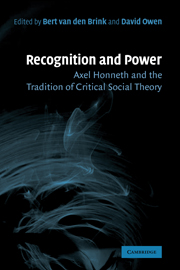Book contents
- Frontmatter
- Contents
- List of Figures and Tables
- Contributors
- Acknowledgments
- 1 Introduction
- PART I PHILOSOPHICAL APPROACHES TO RECOGNITION
- PART II RECOGNITION AND POWER IN SOCIAL THEORY
- 6 Work, Recognition, Emancipation
- 7 “… That All Members Should be Loved in the Same Way …”
- 8 Recognition of Love's Labor: Considering Axel Honneth's Feminism
- PART III RECOGNITION AND POWER IN POLITICAL THEORY
- PART IV AXEL HONNETH ON RECOGNITION AND POWER
- Bibliography
- Index
7 - “… That All Members Should be Loved in the Same Way …”
Published online by Cambridge University Press: 24 July 2009
- Frontmatter
- Contents
- List of Figures and Tables
- Contributors
- Acknowledgments
- 1 Introduction
- PART I PHILOSOPHICAL APPROACHES TO RECOGNITION
- PART II RECOGNITION AND POWER IN SOCIAL THEORY
- 6 Work, Recognition, Emancipation
- 7 “… That All Members Should be Loved in the Same Way …”
- 8 Recognition of Love's Labor: Considering Axel Honneth's Feminism
- PART III RECOGNITION AND POWER IN POLITICAL THEORY
- PART IV AXEL HONNETH ON RECOGNITION AND POWER
- Bibliography
- Index
Summary
In The Struggle for Recognition, Axel Honneth offered an account of the birth, development, and possible demise of the self in the different circles of social interaction. The book's contribution to social theory consists both in advancing concrete views on issues such as the nature of esteem, rights, and respect, and in resetting general agendas and reorienting modes of approach. Thus, Honneth's model brought psychoanalysis back to the center of critical theory after a period of divorce between the two. His account of political conflict as a struggle for recognition calls for novel readings of left- and right-wing ideologies and notions of justice. In this chapter, I will follow these and other directions indicated by Honneth, while departing from assumptions concerning the nature of recognition that differ from Honneth's own assumptions.
According to Honneth, different forms of mutual recognition such as love and legal respect correspond to different spheres of interaction (family, civil society, state) and are constitutive of different aspects of personhood. Honneth's scheme of overlapping tripartite distinctions derives from Hegel's theory of recognition, but Honneth's appropriation of psychoanalytic theory calls these distinctions into question. From the perspective of fairly standard psychoanalytic theory, love and legal respect appear as general features, rather than distinct types, of mutual recognition. While each is more easily discernible in one sphere – love in the private sphere and law in the public sphere – they can be regarded as complementary aspects of a single process, which precedes the division of recognition into specialized forms in different spheres.
- Type
- Chapter
- Information
- Recognition and PowerAxel Honneth and the Tradition of Critical Social Theory, pp. 164 - 188Publisher: Cambridge University PressPrint publication year: 2007



